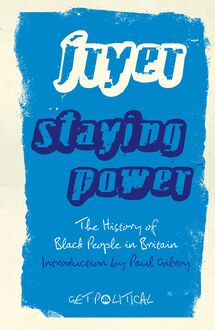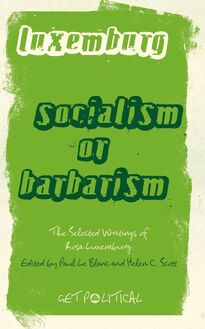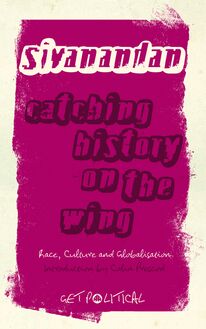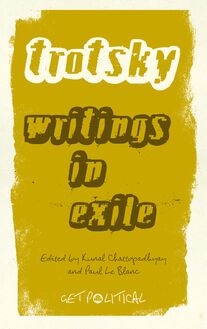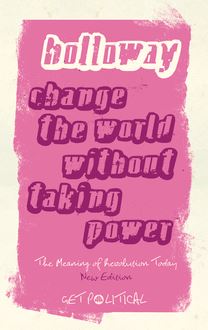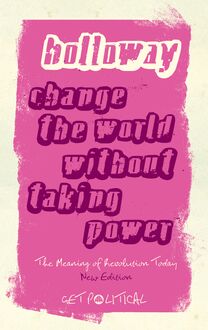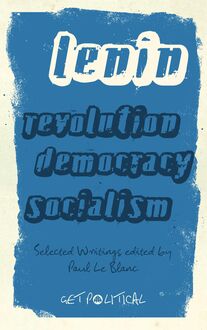-
 Univers
Univers
-
 Ebooks
Ebooks
-
 Livres audio
Livres audio
-
 Presse
Presse
-
 Podcasts
Podcasts
-
 BD
BD
-
 Documents
Documents
-
- Cours
- Révisions
- Ressources pédagogiques
- Sciences de l’éducation
- Manuels scolaires
- Langues
- Travaux de classe
- Annales de BEP
- Etudes supérieures
- Maternelle et primaire
- Fiches de lecture
- Orientation scolaire
- Méthodologie
- Corrigés de devoir
- Annales d’examens et concours
- Annales du bac
- Annales du brevet
- Rapports de stage
La lecture à portée de main
Vous pourrez modifier la taille du texte de cet ouvrage
Découvre YouScribe en t'inscrivant gratuitement
Je m'inscrisDécouvre YouScribe en t'inscrivant gratuitement
Je m'inscrisEn savoir plus
Vous pourrez modifier la taille du texte de cet ouvrage
En savoir plus

Description
Part of Pluto's 21st birthday series Get Political, which brings essential political writing in a range of fields to a new audience.
A. Sivanandan is a highly influential thinker on race, racism, globalisation and resistance. Since 1972, he has been the director of the Institute of Race Relations and the editor of Race & Class, which set the policy agenda on ethnicity and race in the UK and worldwide. Sivanandan has been writing for over forty years and this is the definitive collection of his work.
The articles selected span his entire career and are chosen for their relevance to today's most pressing issues. Included is a complete bibliography of Sivanandan’s writings, and an introduction by Colin Prescod (chair of the IRR), which sets the writings in context.
This book is highly relevant to undergraduate politics students and anyone reading or writing on race, ethnicity and immigration.
Foreword by Colin Prescod
Introduction: Unity of struggle
I The personal and the political
1. The liberation of the black intellectual
2. The hokum of New Times
3. La trahison des clercs
II State racism and resistance
4. Race, class and the state: the political economy of immigration
5. From resistance to rebellion: Asian and Afro-Caribbean struggles in Britain
6. RAT and the degradation of black struggle
7. Race, terror and civil society+ addendum
III Globalisation and displacement
8. Imperialism and disorganic development in the silicon age
9. New circuits of imperialism
10. A Black perspective on the Gulf war
11. Poverty is the new black
Bibliography of writings by A. Sivanandan
Index
Sujets
Informations
| Publié par | Pluto Press |
| Date de parution | 20 septembre 2008 |
| Nombre de lectures | 0 |
| EAN13 | 9781783715671 |
| Langue | English |
Informations légales : prix de location à la page 0,0748€. Cette information est donnée uniquement à titre indicatif conformément à la législation en vigueur.
Extrait
Catching History on the Wing
www.plutobooks.com
Revolution, Democracy, Socialism
Selected Writings
V.I. Lenin
Edited by Paul Le Blanc
9780745327600
Jewish History, Jewish Religion
The Weight of Three Thousand Years
Israel Shahak
Forewords by Pappe / Mezvinsky/ Said / Vidal
9780745328409
Theatre of the Oppressed
Augusto Boal
9780745328386
Black Skin, White Masks
Frantz Fanon
Forewords by Homi K. Bhabha and Ziauddin Sardar
9780745328485
The Communist Manifesto
Karl Marx and Friedrich Engels
Introduction by David Harvey
9780745328461
Catching History on the Wing
Race, Culture and Globalisation
A. Sivanandan
Foreword by Colin Prescod
9780745328348
Race, Culture and Globalisation
A. SIVANANDAN
Foreword by Colin Prescod
The chapters in this book were first published in Race & Class and are reproduced by kind permission of the Institute of Race Relations.
This collection first published 2008 by Pluto Press
345 Archway Road, London N6 5AA
www.plutobooks.com
Copyright © A. Sivanandan 2008
The right of A. Sivanandan to be identified as the author of this work and Colin Prescod as the author of the Foreword has been asserted by them in accordance with the Copyright, Designs and Patents Act 1988.
British Library Cataloguing in Publication Data
A catalogue record for this book is available from the British Library
ISBN 978 0 7453 2835 5 Hardback
ISBN 978 0 7453 2834 8 Paperback
ISBN 978 1 7837 1567 1 ePub
ISBN 978 1 7837 1568 8 Mobi
Library of Congress Cataloging in Publication Data applied for
This book is printed on paper suitable for recycling and made from fully managed and sustained forest sources. Logging, pulping and manufacturing processes are expected to conform to the environmental standards of the country of origin. The paper may contain up to 70% post consumer waste.
10 9 8 7 6 5 4 3 2 1
Designed and produced for Pluto Press by
Chase Publishing Services Ltd, Sidmouth, EX10 9QG, England
Typeset from disk by Stanford DTP Services, Northampton
Printed and bound in the European Union by
CPI Antony Rowe, Chippenham and Eastbourne
CONTENTS
Acknowledgements
Foreword by Colin Prescod
Introduction: Unity of struggle
I
THE PERSONAL AND THE POLITICAL
1.
The liberation of the black intellectual
2.
The hokum of New Times
3.
La trahison des clercs
II
STATE RACISM AND RESISTANCE
4.
Race, class and the state: the political economy of immigration
5.
From resistance to rebellion: Asian and Afro-Caribbean struggles in Britain
6.
RAT and the degradation of black struggle
7.
Race, terror and civil society
III
GLOBALISATION AND DISPLACEMENT
8.
Imperialism and disorganic development in the silicon age
9.
New circuits of imperialism
10.
A black perspective on the Gulf war
11.
Poverty is the new black
Notes
Bibliography of writings by A. Sivanandan
Index
ACKNOWLEDGEMENTS
‘Unity of struggle’ was first published as ‘The global context’ in Race & Class (Vol. 48, no. 4, 2007); ‘The liberation of the black intellectual’ as ‘Alien gods’ in Colour, Culture and Consciousness (London, Allen and Unwin, 1974); ‘The hokum of New Times’ as ‘All that melts into air is solid: the hokum of New Times’ in Race & Class (Vol. 31, no. 3, 1990); ‘La trahison des clercs’ in Race & Class (Vol. 37, no. 3, 1996); ‘Race, class and the state’ in Race & Class (Vol. 17, no. 4, 1976); ‘From resistance to rebellion’ in Race & Class (Vol. 23, nos 2/3, 1981/2); ‘RAT and the degradation of black struggle’ in Race & Class (Vol. 26, no. 4, 1985); ‘Race, terror and civil society’ in Race & Class (Vol. 47, no. 3, 2006); ‘Imperialism and disorganic development in the silicon age’ in Race & Class (Vol. 21, no. 2, 1979); ‘New circuits of imperialism’ in Race & Class (Vol. 30, no. 4, 1989); ‘A black perspective on the Gulf war’ in Race & Class (Vol. 32, no. 4, 1991); ‘Poverty is the new black’ in Race & Class (Vol. 43, no. 2, 2001); ‘The bibliography of writings’ is an updated version of that prepared by Valerie Allport for ‘A world to win’, Race & Class (Vol. 41, nos 1/2, 1991).
FOREWORD
Colin Prescod
There is a generation of Black British community activists who emerged politically in the heady days of the late 1970s and early 1980s, for whom Sivanandan is possibly the most original influence in their lives. They were social workers, teachers, undergraduates and their lecturers, youth leaders, organisers of defence campaigns and members of emerging Black youth and feminist organisations at the grassroots, up and down the country – new generations of youth with Caribbean, Asian and African backgrounds. If they were close to the street, if they were trying to make sense of what was happening as, after 1979, Thatcherism began to bite, they were reading Sivanandan. Photocopies of his articles from Race & Class and well-worn copies of his IRR pamphlets were circulated amongst those who read. For those who wouldn’t, or couldn’t, read, hearing and seeing him speak was their inspiration. And he is a marvellous speaker, a rare combination of analyst, polemicist and orator – and a caller to arms. In fact, he writes in an idiom that rides on the rhythms of his conversational speech. The style is related to a rule of thumb for avoiding the turgid. In his own writing, just as with his editing of the writing of others, he cuts out the mortis that so often accompanies the self-conscious rigor (his joke!) of high academe. And this has marked him out from the other, more academically oriented, influential figures on the radical British scene since the 1960s.
Something of the calm authority with which he told our story, of how he insisted on grasping the meaning behind the immediate pain and irritation of experiencing racism, steadied us – steeled us. It was he who announced, in the telling and retelling of our particular British story, that we had moved from ‘resistance to rebellion’. And it was he who cautioned against the siren seductions of consumerism, poignantly describing what ailed and goaded the souls of inner-city, working-class, Black folk and, at the same time, identifying their demands outside the frame of begging bowl, welfare cheque appeals as ‘a different hunger’. For those who recall the first half of the 1980s as a watershed in Black British politics, Sivanandan was father, elder to them all.
Here was a Marxist who was not intimidated by taunts of revisionism, because he was a Marxist only, as if this is only an only, in the sense of using Marx’s tools to analyse and unlock the conundrums of capitalism on a world scale. But what a craftsman he has been in the use of those tools. His anti-racism and his fierce opposition to the obscenities of injustice have always been inextricably bound up with a profound anti-imperialism – since imperialism, through its colonial and neocolonial successes, has been the major inventor and reinforcer of institutionalised racism on a global scale. And central to the analysis that he presents to new generations of British Black community has been the insistence that, although they might be pinned with the minority labels attached to their presences in the White centres of global capitalism, they are, in fact, part and parcel of the world’s great majority – peasant and working-class, non-White masses. For as long as they remember, even as they first-foot in the First World, that they still have one foot in the Third World, they retain their authority to make radical demands of ‘the system’.
Of course, there were and have been other significant figures presenting their analyses of the post-war Black British experience, but none have made their interventionist intention so transparent. The radical sociologists-cum-cultural analysts simply describe and follow after what emerges from the mass. Sivanandan has always given the impression of getting behind movements and campaigns in order to help push them forward. It was Sivanandan, unseen, who gave his willing ear and wise counsel to the courageous young founders of the Southall Monitoring Group and the Newham Monitoring Project on his doorstep in London, just as, half a generation later, he was still responding to the direct questions brought by the new organisers of community defence campaigns against discrimination and attacks on the fascist-infested estates of Tower Hamlets. With his unfailing ability to move seamlessly between theory and practice, and to travel from the particular experience of grievance or abuse to the general political context and back again to the particular organisational task, he would invent on-the-spot tool kits for these activists. It was he who made them understand that they would achieve the best political results only to the extent that they turned incidents into cases, made cases into campaigns, pushed campaigns until they became social issues and joined social issues with political movements. Sivanandan is one who has constantly underlined the distinctiveness and inventiveness of the ‘Black’ forged in late twentieth-century Britain. More than mere skin colour or ethnic flavour, and more than merely a victim reaction to racism read as a fact of life, it is the colour of those who have had no option but to stand against racism. Its target is not just racial discrimination but also the system of class within which racism is articulated. Its earliest constituency was working-class Black community but it has and does extend to all the new constituencies of those discriminated against who suffer and would resist injustice.
It was this grounding with the brothers and sisters that gave Sivanandan the authority to speak forthrightly to whole communities when, in the mid-1980s, they began to divide themselves into ghetto-ethnicities, often as a means of obtaining state hand-outs. He urged resisters to look every gift horse in the mouth and to bite the hand that fed where necessary. They had to be the beggars who would be the choosers.
-
 Univers
Univers
-
 Ebooks
Ebooks
-
 Livres audio
Livres audio
-
 Presse
Presse
-
 Podcasts
Podcasts
-
 BD
BD
-
 Documents
Documents
-
Jeunesse
-
Littérature
-
Ressources professionnelles
-
Santé et bien-être
-
Savoirs
-
Education
-
Loisirs et hobbies
-
Art, musique et cinéma
-
Actualité et débat de société
-
Jeunesse
-
Littérature
-
Ressources professionnelles
-
Santé et bien-être
-
Savoirs
-
Education
-
Loisirs et hobbies
-
Art, musique et cinéma
-
Actualité et débat de société
-
Actualités
-
Lifestyle
-
Presse jeunesse
-
Presse professionnelle
-
Pratique
-
Presse sportive
-
Presse internationale
-
Culture & Médias
-
Action et Aventures
-
Science-fiction et Fantasy
-
Société
-
Jeunesse
-
Littérature
-
Ressources professionnelles
-
Santé et bien-être
-
Savoirs
-
Education
-
Loisirs et hobbies
-
Art, musique et cinéma
-
Actualité et débat de société
- Cours
- Révisions
- Ressources pédagogiques
- Sciences de l’éducation
- Manuels scolaires
- Langues
- Travaux de classe
- Annales de BEP
- Etudes supérieures
- Maternelle et primaire
- Fiches de lecture
- Orientation scolaire
- Méthodologie
- Corrigés de devoir
- Annales d’examens et concours
- Annales du bac
- Annales du brevet
- Rapports de stage
